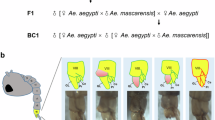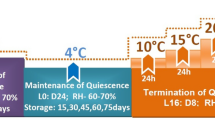Abstract
THE stick insect Carausius morosus Br. reproduces parthenogenetically. However, non-functional males appear spontaneously by loss of a sex-chromosome. This occurs with a frequency of about 0.5 per cent at 16°–20° C. Sexually aberrant individuals showing gynandromorphism and/or intersexuality are also found at frequencies of up to about 2 per cent. Higher percentages of ‘non-females’ are obtained when eggs are treated with high temperatures or X-rays1–3. The following experiment shows that centrifugation of the eggs may also influence the sex of C. morosus.
This is a preview of subscription content, access via your institution
Access options
Subscribe to this journal
Receive 51 print issues and online access
$199.00 per year
only $3.90 per issue
Buy this article
- Purchase on SpringerLink
- Instant access to full article PDF
Prices may be subject to local taxes which are calculated during checkout
Similar content being viewed by others
References
Wilbert, H., Zool. Jahr., Zool. Phys., 64, 470 (1953).
Bergerard, J., Endeavour, 21, 137 (1962).
Pijnacker, L. P., thesis, Univ. Groningen, (1964).
Kostoff, D., Cytologia, 8, 420 (1938).
Author information
Authors and Affiliations
Rights and permissions
About this article
Cite this article
PIJNACKER, L. Effect of Centrifugation of the Eggs on the Sex of Carausius morosus Br.. Nature 210, 1184–1185 (1966). https://doi.org/10.1038/2101184a0
Issue date:
DOI: https://doi.org/10.1038/2101184a0
This article is cited by
-
Karyotypic variation in bisexual species and pseudogamous forms of the planthopper genus Ribautodelphax (Homoptera, Delphacidae)
Genetica (1988)
-
Sex chromosomes and origin of males and sex mosaics of the parthenogenetic stick insect Carausius morosus Br.
Chromosoma (1980)
-
Die Auspr�gung von Polarit�t und Bilateralsymmetrie in den Oocyten vonGryllus domesticus L.
Wilhelm Roux' Archiv f�r Entwicklungsmechanik der Organismen (1968)
-
The maturation divisions of the parthenogenetic stick insect Carausius morosus Br. (Orthoptera, Phasmidae)
Chromosoma (1966)



